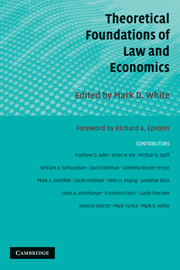Book contents
- Frontmatter
- Contents
- Foreword
- Preface
- Notes on Contributors
- PART ONE THE ROLE AND USE OF ECONOMICS IN LEGAL STUDIES
- PART TWO EFFICIENCY
- 5 Efficiency, Practices, and the Moral Point of View: Limits of Economic Interpretations of Law
- 6 Numeraire Illusion: The Final Demise of the Kaldor–Hicks Principle
- 7 Justice, Mercy, and Efficiency
- PART THREE RATIONALITY AND THE LAW
- PART FOUR VALUES AND ETHICS IN CIVIL AND CRIMINAL LAW
- Index
- References
5 - Efficiency, Practices, and the Moral Point of View: Limits of Economic Interpretations of Law
Published online by Cambridge University Press: 06 July 2009
- Frontmatter
- Contents
- Foreword
- Preface
- Notes on Contributors
- PART ONE THE ROLE AND USE OF ECONOMICS IN LEGAL STUDIES
- PART TWO EFFICIENCY
- 5 Efficiency, Practices, and the Moral Point of View: Limits of Economic Interpretations of Law
- 6 Numeraire Illusion: The Final Demise of the Kaldor–Hicks Principle
- 7 Justice, Mercy, and Efficiency
- PART THREE RATIONALITY AND THE LAW
- PART FOUR VALUES AND ETHICS IN CIVIL AND CRIMINAL LAW
- Index
- References
Summary
Law-and-economics theories treat legal issues as economic problems. Because society has limited resources to devote to its legal institutions, it is important to consider their economic costs in deciding how these institutions are best operated. I shall argue, however, that for a theory to be persuasive in either explaining or prescribing legal rules, it needs to recognize moral ideals apart from economic efficiency, such as justice and fairness, that may account for why we have legal institutions in the first place and that may be essential to our finding them acceptable.
LAW AND ECONOMICS AS EXPLANATIVE AND NORMATIVE THEORY
Economic approaches to law generally assume that human behavior can be understood as the result of people's rational choices to maximize their utility or satisfy their preferences. Some law-and-economics proponents use this assumption to explain why practices emerge or predict how people will respond to rewards or punishments. Some use this together with another assumption, that social and legal policy ought to be driven by the goal of promoting or maximizing social utility or welfare, to generate prescriptive or normative theories. For example, on the law-and-economics approach, the purpose of punishment is to deter undesirable conduct that diminishes social utility. A sanction deters by imposing a cost on potential criminals; the harsher the sanction, the higher the price of committing crime. Imposing sanctions has a social cost that must be weighed against the utility of deterring crime.
- Type
- Chapter
- Information
- Theoretical Foundations of Law and Economics , pp. 77 - 95Publisher: Cambridge University PressPrint publication year: 2008

